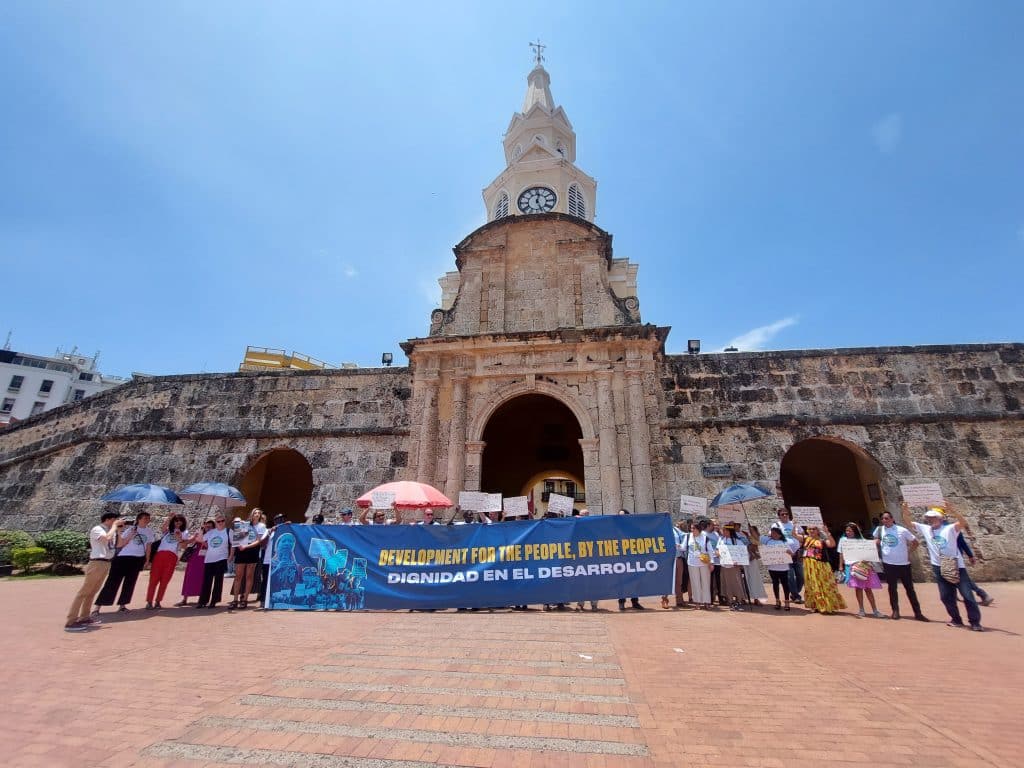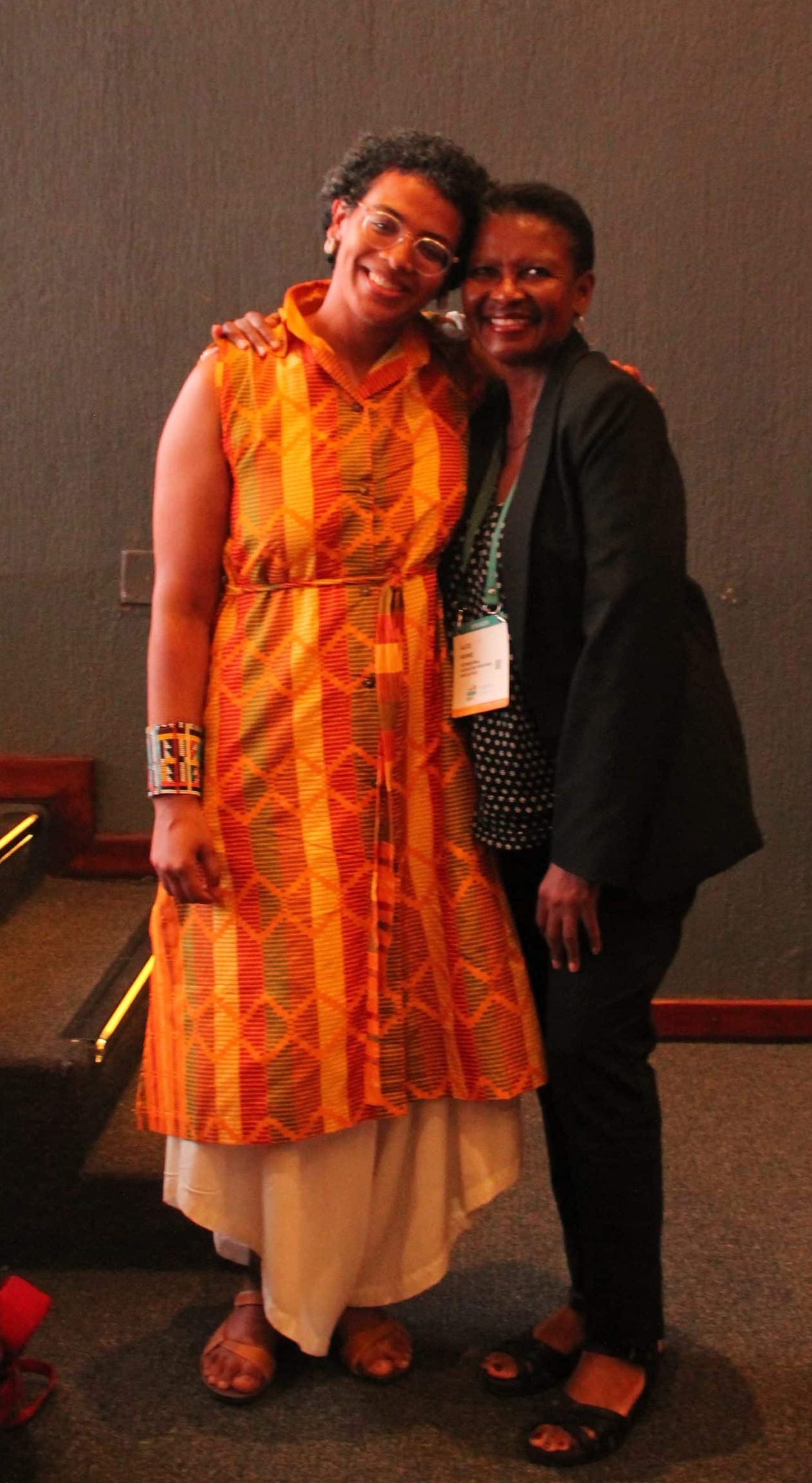This article was originally published by Yannia Sofia Garzón Valencia on the online platform Diaspora on 11 September 2023.
The fourth Finance in Common Summit was held in Cartagena, Colombia, on September 4-6 of this year. Bankers, finance ministers, directors of economic conglomerates with special emphasis on infrastructure, directors of “green” mechanisms, deans of finance and economics faculties, some philanthropic institutions, national and international NGOs, civil society organizations, delegations of indigenous and Afro-descendant peoples met there. Certainly, a little more than 75% of the participants and those invited to speak were men, white men. At the opening panel, the chair designated for civil society did not take the stage because unless they were “high profile” they could not sit next to presidents of banks that operate “development aid” resources.
The last summit was held in Abiyan (Côte d’Ivoire) and civil society organizations, with an emphasis on human rights advocacy, advocated to ensure that at this Summit there could be more discussions about human rights violations arising from the financing of projects in the extractive sector. These projects often require huge investments , and the required safeguards and independent consultations or research mechanisms are insufficient. Despite a predominant narrative saying that development banks are contributing to the fulfillment of sustainable development goals and advancing the sectors needed to mitigate climate change, as it is being discussed at the current summit, the projects funded by these banks are actually indebting entire generations and promoting carbon markets, wind farms, green hydrogen production, construction of mega power plants. What all these projects have in common is that they lead to land-use change, the displacement of populations and entire communities. And with them, their knowledge about the ecosystems they preserve and that end up being completely annihilated, by false new solutions that only include communities and populations when it comes to appropriate their own narratives, expanding market niches around an energy transition model that perpetuates and expands the impacts of the extractive sector.

Mobilization action during the Finance in Common Summit. Credit: Coalition for Human Rights in Development
In this present context, Afro-diaspora peoples need to organize against this updating of the instruments that place the neocolonial foot on our necks. Mia Mottley already took an important step forward in October last year, at the United Nations National Assembly, by stating that the World Bank and International Monetary Fund no longer work for the realities of 21st century countries.
Tendayi Achiume has woven the connections between
racial and environmental justice and climate crisis (2022) as well as the implications of the global extractive model and racial equality (2019) in her tenure as Special Rapporteur on contemporary forms of racism, racial discrimination, xenophobia and related intolerance. This is also why Prime Minister Mottley has put her finger on the sore spot, pointing out that it is the current architecture of the international financial system that prevents prosperity from being collective, and that we need a commitment that could well be based on those
ten recommendations that – at the time of Covid-19 – the African women’s communications and development network proposed to the delegates of the African union and to those who would like to support their work. A work towards re-imagining African political economies, which includes also the diasport as sixth region.
The four common finance summits have been diluting the scope of what should be the adjustments of these architectures, which are still the tools of the master’s house. They have been announcing support for small and medium-sized enterprises that are led by women and that include in their branding narratives on environmental care. But they want to articulate them in global value chains where, once inserted, they would be at the mercy of deregulation , with no one to turn to in an obvious case of instrumentalization of the gender discourse and the climate crisis.

Blog’s author Sofia Garzòn with Alice Mogwe (director of Ditshwanelo and president of FIDH)
National care systems can respond to this challenge but, in order to have a significant impact, they need to be built collectively on the basis of the knowledge that has made it possible to reproduce and sustain life since before the existence of nation-states; they also need to be articulated and integrated into social investment and supported by international financing, particularly in the face of community proposals, from those resources that are read as “official development aid” and that serve to alienate middle and low income countries to multipolar interests, such as the European Union. As agreed at the Munich security conference, these interests are now focused on the processing, exploitation and transformation of big data that favors military coordination in regions where access to drinking water, nutritious food and electricity are still rights to be exercised.
I am convinced of what the ancestral, community and collective authorities have always said: our territory, our lands, are the main guarantors of our rights. This is why it is urgent to care for, protect and defend the land and all the life that lives on it. And we need to be alert to the danger of the so-called false solutions, which promote a type of social paradigm that makes 10 people visible while 10,000 still suffer the violence of hunger.
At the same time, we need to continue identifying, recovering and sustaining practices that move us away from the financialization of daily life, a common Pan-African and feminist horizon; to make collective care survive and flourish. These practices can re-signify and re-dimension our conceptual understanding of wealth and poverty, dignity and justice. This process requires analysis, measurements and trans-local articulations, to deepen the concept that the West calls human rights, and which in our own system of knowledge we recognize as: “Ubuntu: I am because we are” as reiterated at the closing of the Summit by Alice Mogwe, director of the International Federation of Human Rights. In Colombia, it is this approach that should inspire us and guide every action in our horizon and practice of change.


